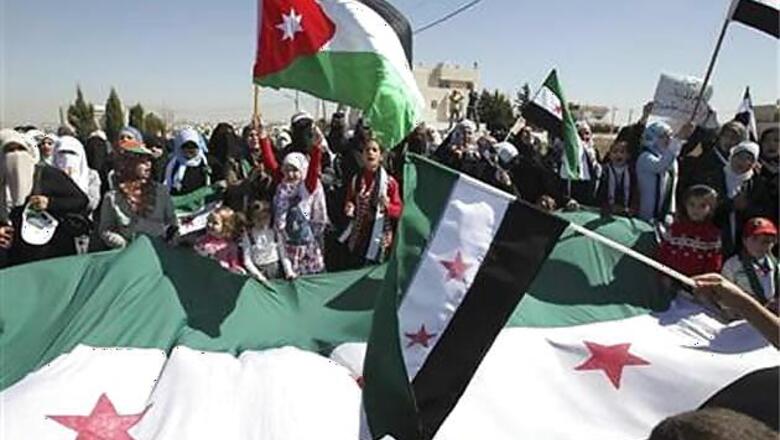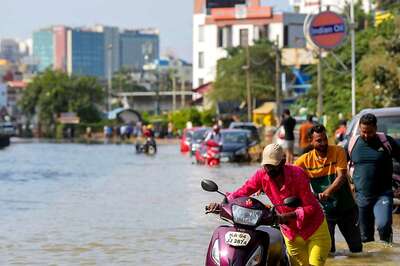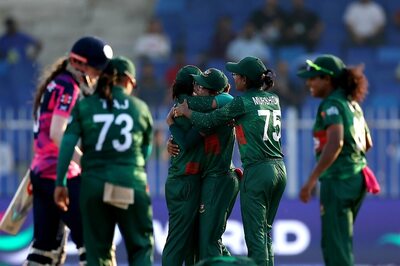
views
With nearly 500 people reported killed in a week of rebel infighting, many Syrians barricaded themselves in their homes on Friday, while others emerged from mosques angrily accusing an al-Qaida-linked group of hijacking their revolution.
The rebel-on-rebel clashes have overshadowed the battle against President Bashar Assad and underscore the perils for civilians caught in the crossfire of two parallel wars.
The violence, which pits fighters from a variety of Islamic groups and mainstream factions against the feared al-Qaida-linked Islamic State of Iraq and the Levant, have spread across four provinces in opposition-held parts of northern Syria.
The infighting is helping Assad, whose forces have clawed back some of the ground lost to the rebels in recent months as they bombard the north and other opposition regions with warplanes, heavy artillery and crude explosive-filled barrels dropped over rebel neighborhoods.
"The revolution has been derailed," said Abdullah Hasan, a self-described secular activist in the northern town of Maskaneh, where fighters from the al-Qaida-linked group swept in last month. "None of the groups fighting in Syria represent me now," he said, adding that he was nonetheless hopeful that the infighting would help purge extremists from the ranks of the rebels.
The latest bout of violence broke out a week ago across northern Syria and is the most serious among opponents of Assad since the civil war began.
The Britain-based Syrian Observatory for Human Rights said Friday that at least 482 people have been killed in the infighting since January 3. It said 157 were from the Islamic State of Iraq and the Levant, 240 from more moderate factions and 85 were civilians.
The death toll mirrors and even exceeds casualties from the broader war between government forces and the rebels in the same time frame. The Observatory, which documents casualties on a daily basis through a network of activists on the ground, has recorded 385 people killed between January 3 and January 9 in fighting between rebels and government forces. But casualties among soldiers are difficult to track down and are often under reported.
The Islamic State of Iraq and the Levant and another al-Qaida-linked group known as Jabhat al-Nusra, or the Nusra Front, initially joined forces with moderate rebels fighting to oust Assad in a conflict that began in March 2011 as a popular uprising but morphed into a civil war.
The extremists proved well-organized and efficient fighters, giving the ragtag rebels a boost. But the Iraqi-based Islamic State of Iraq and the Levant, which includes many foreign fighters, has alienated many Syrians over the past several months by using brutal tactics to impose its strict interpretation of Islamic law.
The group has also kidnapped scores of foreign journalists and activists, and killed and beheaded opponents in areas it controls. Earlier this week, dozens of dead bodies were found at a hospital allegedly used as the group's local headquarters in Aleppo, many of them blindfolded and with their hands tied behind their backs.
Opposition groups said the dead were captives killed by the al-Qaida militants before they retreated from the hospital.
The Nusra Front has largely stayed on the sidelines of the ongoing clashes, and in some places has tried to broker a truce.
The collection of ultraconservative rebels and more moderate brigades have made headway against extremist fighters in several areas in the provinces of Aleppo, Idlib, Hama and Raqqa - although the al-Qaida-linked group has managed to regroup and curb some of its losses.
Bari Abdellatif, a resident of the town of al-Bab in the Aleppo countryside, said al-Qaida fighters seized control Friday of wheat silos and mills just outside the town, and were trying to storm it from several fronts.
He accused the extremists of confiscating flour and bread and distributing it to areas under their control, leading to severe shortages in al-Bab.
A group of people in the town emerged from mosques following prayers Friday, marching in protest.
""Those who stole the revolution are traitors!" some shouted, while others chanted slogans in support of the Free Syrian Army, the Western-backed umbrella group that includes more moderate factions. "Free Syrian Army forever!" they cried.
The proliferation of radical groups among rebel ranks has dampened US support for the Syrian opposition. With only two weeks to go ahead of an international peace conference on Syria to be held in Switzerland, many Syrians are now convinced the US is even considering a future in which Assad stays in power.
In Kfarnubul, a town in northern Idlib province, protesters held a placard that showed President Barack Obama polishing a bloodied shoe with a picture of Assad and a Syrian flag on it.
Another showed the US president watering a plant called ISIL, the English acronym for the Islamic State of Iraq and the Levant. The drawing reflected views that the US retreat from its support for moderate rebels in Syria was strengthening the extremists.
Hasan, the activist in Maskaneh, said people there did not dare leave their homes, fearing intimidation and arrest by the al-Qaida militants patrolling the streets.
Attendance at Friday prayers was markedly lower than usual as well, because people were afraid that extremists would send car bombs, a tactic they have recently started using against other rebels, Abdellatif said.
The principles of the revolutions have all gone, Hasan said.
"It was about freedom and dignity. Now it's a sectarian war and just people killing each other," he said.



















Comments
0 comment